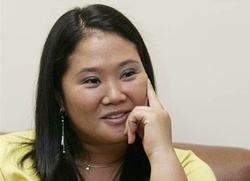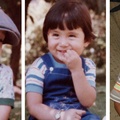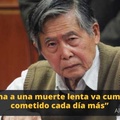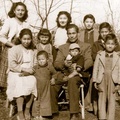Even when Alberto Fujimori is not the topic of conversation—and I haven’t changed my opinion of him one iota—it’s his daughter Keiko Fujimori who takes center stage, as she is one step closer to becoming president.
Through the usual dirty campaigns, we have shown the desperate efforts to condemn Keiko despite her flawless political trajectory since 2006, when she received the highest number of votes ever in Peru at the legislative level. Her family background was supposed to prejudice Keiko by blaming her for everything that had happened in the recent past. Such plans went by the wayside and, as such, the only thing left was to resort to stories that linked Keiko to her father, whose official but far from substantiated corruption led to his condemnation, permiting her detractors to smear her until she becomes too unrecognizable. These campaigns, however, have failed to damage her popularity.
Seen from a distance, it is easier to obtain a rapprochement with the truth because even the truth is weakened by cloudy lies that darken the sky. It is better to rely on varied sources of information from all over rather than restrict oneself to only one side of the coin. We are neither exposed to the repeated songs of the sirens who purvey such phrases as “true to the extent,” nor are we within the reach of the fear mongers. All of this happens until they unmask those who, among the many lies, demand vengeance and security. Those who, in any given moment, suffered from both Fujimori’s disdain and violent attacks in his open fight against corruption, drug trafficking, and the assassination of the protected groups of the extreme left (in these situations the political extremes are always affected).
Despite this virulent and million-dollar campaign of personal attacks, two undesirable and fearful extremes stubbornly maintain themselves inside the first votes cast for the many presidential hopefuls. On the one extreme, there is Ollanta Humala, a former military man from the notorious School of the Americas (just like Vladimiro Montesinos) with a sullied history not yet sufficiently known. And on the other side, Alberto Fujimori’s daughter who, it is safe to say, inherits her father’s persistence in the face of mounting pressures, and who supports the democratic process that favors, once again, the Peruvian masses. In general, Keiko, as the authentic Nikkei, is absolutely sure what constitutes justice.
For that reason, both candidates were likened to “cancer” and “AIDS,” branded as such by the imaginative brilliance of renowned author Vargas Llosa (as an aside, I admire his literary works), which, no doubt, due to his prestige, allows such rhetoric to take hold among those power groups that recovered their (historical) privileges after Fujimori had taken them away for ten long years. But what these groups reaped in terms of political gain was equally meager despite the tremendous public relations display that took on international dimensions. Peruvian hope centered around those whose voice was silenced with viciousness.
The results of the first vote were precise. Only Humala and Keiko are able to continue. After this bucket of cold water, I imagine that desperate backroom meetings will continue. Anyone but another Fujimori! And we have heard more statements by Vargas Llosa, with a 180 degree turn-around as he is supporting Humala, and has urged Peruvians to follow in his steps.
June is the moment of truth, and out of this bubble filled with self-interest, I am certain that Keiko Fujimori will be elected president by those who have been oppressed and those who will weight the realities without conforming to the “gushing” of impending political attacks. The voiceless will be made to feel strong because the only place for citizens to express themselves is in the voting booth. And the memory of, gratitude for, and faith in the “little chinaman” will be embodied in the figure of this woman who has not lost heart, even when she has had to remain silent in much the same manner as the voiceless Peruvian.
And how will this relevant Peruvian-Nikkei community conduct itself, the same community that doubted its role in 1990? I would have liked to have read inside the Fujimorista camp some Japanese name, but I did not have such luck. I hope one day to see more Japanese names put forward effortlessly. But this is not important. The only thing that matters now is—without being able to put aside the tradition of silence and second-class citizenship—that the Nikkei express themselves in voting booth to show the strength of the Japanese community, which always blossoms in critical moments like this one. (It would be interesting to review one more time the scenes of courage and commitment by the Nikkei community for the Japanese on March 11 of this year). Otherwise, Keiko needs at her side right now good people who will show their support tomorrow.
The right outcome has to be achieved this June when the people vote, and, without any place for doubt, to count on the votes and political engagement of the Peruvian Nikkei.
© 2011 Ariel Takeda






